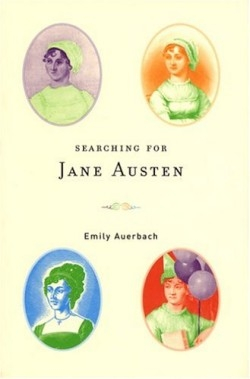
Searching for Jane Austen
Everyone is talking about Jane Austen and thats the problem, according to the author. The greater the “Jane” sensation, the less we know about the real Jane Austen. Auerbach wants to stage an intervention in the popular perception of the novelist, and she has written this book in an accessible style free of theoretical jargon for the extensive readership that Austen continues to enjoy.
The author is professor of English at the University of Wisconsin-Madison and director of the Courage to Write series of radio documentaries on brave women writers. She has won teaching, broadcasting, and arts awards and has published widely on nineteenth-century literature.
The first and last chapters of her new book will be of most interest to the specialist as they assess the attempts, early and late, by relatives, editors, commercial publishers, and filmmakers to fashion a prettified, sentimental, declawed Jane Austen. Auerbach traces this distortion back to a biography by Austens nephew, who alters pictorial images of his aunt, deletes lines from her letters, softens her invective, and recasts her as appropriately demure and ladylike. Nearly two centuries later the public image of Austen is culturally airbrushed, complete with a wedding ring, although she was unmarried.
Chapter Two conducts the reader on a tour of Austens early sketches, mini-novels, skits, letters, and scraps, which were written only for family entertainment. Auerbach writes that they “parody sentimental fiction, reverse gender roles, and reject every precept in conduct books for girls, presenting heroines who get drunk, lie, steal, and murder.”
The middle chapters offer close readings of her six finished novels. Auerbachs affinity for Austens values system makes this a good guide for either the beginning student or the longtime fan who desires a sympathetic companion to the books and characters. Drawing on the work of scholars like Claudia Johnson and feminists Sandra Gilbert and Susan Gubar, Auerbach suggests that the novels contain a clandestine commentary on the superficial and, at times, immoral English upper classes. “Ironically praising characters with obviously flawed values,” Austen articulates an oblique, and thus publishable, indictment of Regency England. To condemn is not all, however; Austens novels hold out a promise, as Auerbach says of Persuasion, “that happiness comes to those with patience and perseverance, a warm, unselfish generosity toward others, a desire to be useful, an awareness of other worlds, and an openness to change.”
Searching for Jane Austen has much to do if it is to replace the starry-eyed romantic Austen of the recent wave of film treatments with the sharp-eyed, and sharp-tongued, social critic of manners and mores. Auerbach quotes Ang Lee (director of a film version of Sense and Sensibility) and satirists Andy Rooney and Dave Barry as representative of those who, while they havent read Austen, dislike her anyway. Such is the uphill battle ahead.
Reviewed by
Vince Brewton
Disclosure: This article is not an endorsement, but a review. The publisher of this book provided free copies of the book to have their book reviewed by a professional reviewer. No fee was paid by the publisher for this review. Foreword Reviews only recommends books that we love. Foreword Magazine, Inc. is disclosing this in accordance with the Federal Trade Commission’s 16 CFR, Part 255.
